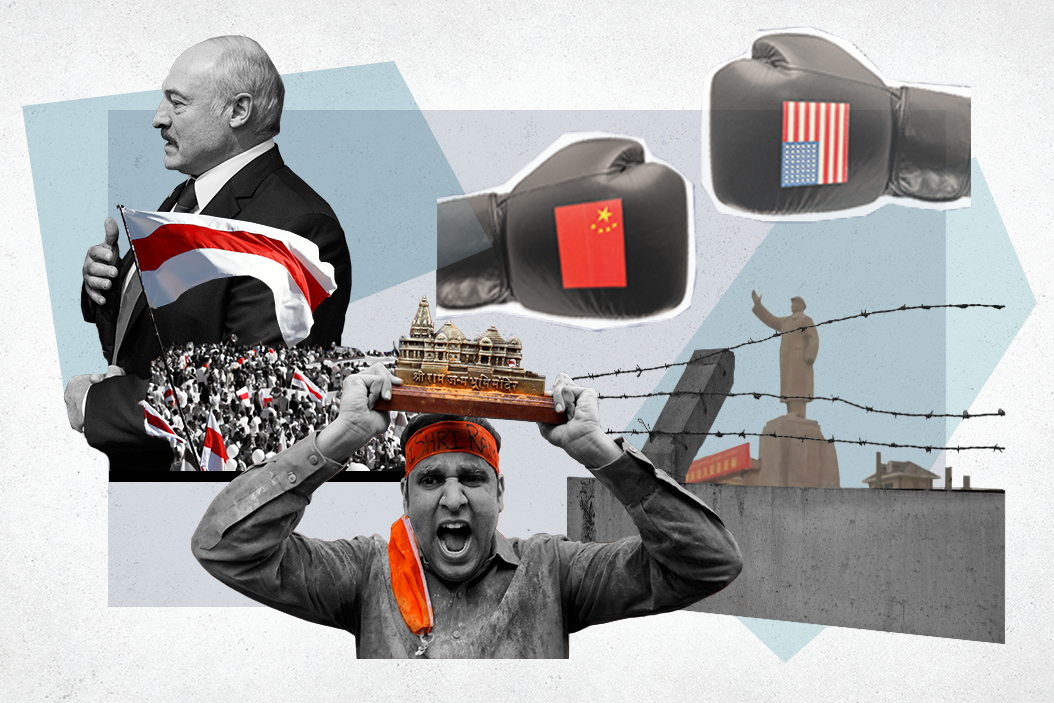This year has been disastrous on so many levels as the COVID crisis wreaked havoc around the world. While coverage of the once-in-a-century pandemic dwarfed everything else in 2020, we have seen other huge political stories this year that will continue to shape the world for years to come.
We, your four Signal writers, each chose one big story that, to one degree or another, went under the radar as the global health crisis took centre stage. What do these tell us about the current state of our G-Zero world?
Carlos' pick: China's subjugation of Xinjiang. Over a million detained in mass "reeducation" camps. Forced sterilization. Muslims barred from wearing beards and veils. An entire region the size of Iran turned into an Orwellian surveillance state. In 1989, the Tiananmen massacre led to years of international isolation for China — but that was before decades of explosive growth, the creation of a complex network of international trade ties, and the arrival in Beijing of Xi Jinping. In 2020, the strongman president ended democracy in Hong Kong, continued militarizing the South China Sea, and sharply upped pressure on Taiwan. All these shows of force got more attention than China's persecution of minority ethnic Uighurs in Xinjiang. In my view, China is succeeding in its quest to dominate this once-restive region because Xi takes the long view: the West will express outrage but move on quickly to other issues, leaving 12 million Uighurs at Beijing's mercy. That's a chilling message for ethnic minority groups seeking political power around the world, especially in Asia (yes, I mean you Indonesia and Myanmar), where China will be calling the shots for the foreseeable future.
Alex's pick: Turmoil in Belarus. An aging autocrat overtly rigs an election. Hundreds of thousands take to the streets. Security thugs crack skulls, raid universities, and torture people. Europe and the US slap sanctions on him. And months later... the guy is still in power. That's the story of Belarus strongman Alexander Lukashenko, who has faced mass protests on and off since August. I chose this story for 2020 because it's a sobering narrative that we've seen time and again in recent years — whether in Venezuela, or Hong Kong, or Thailand: no matter how big the protests are, so long as leaders keep their security services on side and find some key foreign friends (looking at you, China and Russia) they can usually ride things out. And even when despots are deposed, their cliques often find a way to maintain power anyway (hello to Algeria and Sudan — Tahrir Square you say? Same same.) To me, the grim but important lesson is that the moral momentum of millions doesn't always bend the arc of the universe as fast as we'd like. That's especially true at a time when the rest of the world is so distracted by the pandemic, and when democracy is suffering globally to begin with. Can 2021 flip the script? I'll wait here.
Gabrielle's pick: Hindu nationalism in India. Earlier this month, Indian police made their first arrest under the so-called "jihad law" — a controversial phrase dubbed by Hindu nationalists who contend that Muslim men surreptitiously seduce Hindu women, forcing them into marriage and conversion to Islam. The suspect, a Muslim man in his early 20s, says he has "no link" to the woman he stands accused of luring. This development is the latest in an ongoing saga in India that's seen Prime Minister Narendra Modi and his nationalist BJP party try to turn the country into a Hindu-nationalist state. Throughout 2020, India's 200 million Muslims have increasingly found themselves under attack: footage released earlier this year from New Delhi, the capital, showed local police joining Hindu vigilantes in attacking Muslims, resulting in scores of deaths. Meanwhile, a discriminatory citizenship law that offers refuge in India to ethnic minorities from neighboring countries (while excluding Muslims from those protections) gave rise to violent clashes along religious and ethnic lines. Modi also stands accused of stripping majority-Muslim Kashmir state of its autonomy to flood the area with Hindu settlers. Though the BJP's anti-Muslim aggressions are well documented and the country faces an uphill battle in containing the coronavirus pandemic, Modi continues to defy political gravity, maintaining high popular support that gives him a mandate to continue to shape the future of the country's 1.4 billion inhabitants.
Willis' pick: The intensifying US-China rivalry. Had COVID never happened, the intensifying US-China rivalry — particularly in trade and tech — would probably have been the international story of the year. The pandemic itself both obscured the importance of this standoff and heightened its intensity by provoking mutual recrimination over responsibility for COVID fallout. In 2021, Joe Biden and Xi Jinping will want to dial down tensions, at least at first. But, as Xi well knows, the great difference between the Biden and Trump approaches to China rests mainly in Biden's determination to coordinate a containment strategy with allies in Europe and Asia. Trade, tech and data disputes, Hong Kong, and repression of Muslim Uighurs will offer plenty to talk about. As 2021 progresses, however, we'll be reminded that the US-China rivalry is far more complex than the US-Soviet conflict, because 21st century economic interdependence is far deeper, and because common problems like global health and climate change transcend iron curtains and border walls.
